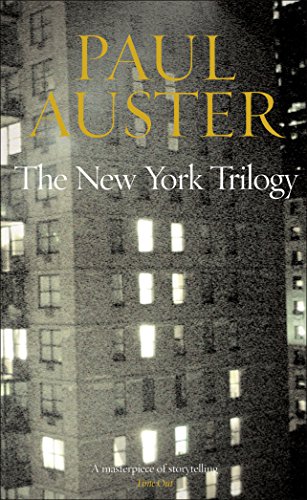Here’s another left field book, a pick for a book club on Meetup. I’d never heard of The New York Trilogy before, or even Paul Auster. There’s a whole slew of literature from the 80s and 90s that were too new to be part of curricula but too old to be topical by the time I was reading Big Serious Grown-Up Book, and The New York Trilogy falls neatly into that category.
It’s unclear to me whether the now-accepted convention of publishing all three novels (novellas, really) as one collection is according to Auster’s own wishes or a publishing company decision, but I have to say I can’t imagine reading any one of these stories in isolation, or what it would have been like to read the first and then have to wait a year to read the next two. Not because the first story ends on a cliffhanger that gets resolved in the sequels, but because it must have felt incomplete. (Or maybe I’m only saying that because I only know it as one chapter in a larger book.)
The New York Trilogy consists of three novellas: City of Glass, Ghosts, and The Locked Room. All three have the same, or nearly the same, noir-adjacent plot point:* the protagonist is induced into tailing a mark for some shadowy purpose. In City of Glass it’s a mystery writer who is mistaken for a private investigator; in Ghosts it’s an actual private detective we only know as “Blue” who is paid to follow “Black” in a world with only colors for names; in The Locked Room a frustrated writer finds himself obligated to track down his missing-presumed-dead friend who has become a posthumous literary success, whose widow he has now married and whose son he is now raising.
*Paul Auster on LitHub: “… it was always irritating to me to hear these books described as detective novels. They’re not that in the least.” Sorry, Paul.
Mistaken identities, self-referentiality, literary references, meditations on language and madness and identity permeate all three books. At the moment of writing I’m still waiting for my book club to meet to discuss it, but as it currently stands I’m not sure I got the point, or if there even was a point, but I still liked the ride.

